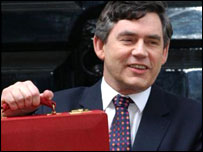![]()
![]()
GORDON BROWN
![]()
Old Hickory

Despite David Cameron's vow to drop Punch and Judy politics, he recently made an ad hominem attack on Gordon Brown, saying that he was a creature of the past, that he was extreme, awful and that he spoke like a ‘speak-your-weight’ machine. He clearly expects Brown to be his opponent at the next election and that could be the case. But Brown’s legacy in Number 11 is not looking as good today as it has been held to be for most of his time there. Whether Cameron can offer a radical alternative to Brown at the next election seems to depend on him dropping most of the changes he has hinted at since he won the Tory leadership and especially in the first week of 2006. He needs to stop pussyfooting over tax cuts. But in hitting out at Brown, he was hitting out at a man who lately seems to have tarnished his whole record as Chancellor of the Exchequer.
Sunday, 8 January 2006, Tony Blair gave an interview to the Observer saying that, maybe, David Miliband might do better against David Cameron than anyone else. He added that the changes Cameron was making in the Conservative Party were a compliment to New Labour. The day before, the Daily Mail carried the story “Cameron's bandwagon puts fear into Brown” (p.6). Brown seems to feel that Cameron is a fresh excuse for Blair to hang on till someone else can replace him as the new leader. Blair has suggested that he might hang on till 2010. Blair has said he is not going anywhere and the fact that he has won three elections shows that the public want him. Brown prefers experience rather than having the election in the honeymoon period as Blair has suggested. Blair has said he is happy for Brown to take over but also said the other things too. Brown supporters say it is not up to Blair who should take over as the leader when he retires. When the latest oil scarce came to a head around the beginning of December 2005, the firms decided to put their prices up in order to cope with it, but Gordon Brown, who has fallen short on his forecasts of late, decided that it was another chance to take a windfall tax. He doubled corporation tax on North Sea oil and gas producers. This is not likely to aid a sector that is already in decline. It is run by firms that now have the greater problem of coping with increased demand from the growing India and China, the recent natural disasters that have affected oil and the instability after the UK-USA invasion of Iraq. It would be best for one and all if the oil industry was encouraged at this time by less taxation rather than discouraged by more of it.
The UK Offshore Oil Association sees three likely scenarios for the future of North Sea output. All three are of decline but the greater the investment now the slower the decline will be. Oddly, what Brown has done has messed up things for those who take over from him, if he becomes the leader of the Labour Party. It was estimated that the taxes due would have been either £40 billion at the lowest, or £120 billion at the highest. But with lower funds for investment owing to this windfall tax, the lowest scenario could be way too high. Brown has ensured an even gloomier future than the worst they imagined. No sign here of his celebrated prudence.
Earlier, Brown showed a similar lack of prudence when he raided the pension schemes. When New Labour came to power in 1997 many were proud of the state of UK pensions when they contrasted them to the schemes in the rest of the European Union [EU] lands. Maybe this is what New Labour, the Labour that now favours the eventual EU superstate, did not like. They wanted things more uniform with the EU lands. Everything has to be got into line for the slowly emerging superstate. A short run benefit of this was another of Brown's special windfall taxes.
He found the state pensions almost in the same rude health as the private ones, that had risen even faster than wages in the 1980s and '90s. The state pensions looked affordable for the years ahead. In his first budget, Brown took more than £5 billion a year from the healthy private pension funds by taking away their dividend tax credits. This was a blow that did those funds no good, and it was haply the major factor in bringing about the normalisation with the EU lands.
Not only is Brown not prudent himself, he is particularly fond of means tests that tend to carry the moral that it is foolish to be prudent. Brown thought that the best way of alleviating hardship amongst pensioners was to freeze the basic pension and to boost those who were without savings. The effect of this is to turn saving into pure folly. It ensured that the stakeholder pension scheme that New Labour attempted to innovate to get people to save a bit more would fail. It is now is said by the Association of British Insurers that less than a third of pensions will be off the means test in 20 years time.

Brown has run up a deficit of £30 billion. After his first few years of pretending to be prudent, he put lots of money into the National Heath Service [NHS]. All governments have been able to boast that they have spent record levels on the NHS during their time in office, so there is little new there. However, that is hardly something to boast about. Yet this was even the case with Mrs Thatcher, who rightly said that the NHS was safe in her hands. As ever, not much as resulted from those funds going into the NHS. Under Mrs Thatcher, the supporters of the NHS thought that she was a liar, and that she was actively running the NHS down. They would see the same today, but now they look for improvements and tend to produce a report that would be just as true for Mrs Thatcher's time viz. that there is some slight improvement but not nearly so much as expected.
Money was also thrown at schools once the prudent first two years were over. They seem to be not much better as a result either. New Labour put up targets but when they were ignored there was no penalty. Access to the taxpayer means that one has to be a bit masochistic to impose a penalty. Losses on the market from customer neglect are automatic and require no perverse discipline to be imposed. That is one reason why the market serves the public whilst the state taxes them.
Transport by contrast had little devoted to it by Brown. The regulation of New Labour, especially in the wake of the train crashes, was disastrous. They enforced a go-slow for months and forced more people to go on the roads that, statistically, are more dangerous. But this is more down to New Labour in general rather than to Brown in particular.
The state began a policy of top-ups for the low paid, overpaid them a great deal, effectively put them into debt to the state and then demanded that they pay the state back. What would we think of a benefactor who gave us a gift out of the blue that we accepted in good faith and then returned later asking us to pay back some of it. We might think, if not say, that we might not have been in debt if he had left us alone to begin with. Many people now have to pay back in full or at £40 a week. And all this from a man who has made the word “prudence” his motto. Well, Brown might say that they will need to be prudent if they are to continue that £40 payback each week.
The one time that New Labour fell behind the Tories in the opinion polls was when Brown’s Green extra tax lead to protests from the motorists. Within a week or so Brown backed down.
Brown did one good thing by allowing the Bank of England to set interest rates. That ensured something nearer to the economic rate being set.
Brown said he would only borrow to invest, but his idea of investment, such as schools or the NHS, is dodgy and usually not investment at all but consumer spending. He has introduced 41 tax rises. He took over a £20billion surplus from the Tories but is now in deficit to the tune of £30 billion. For the immediate future, he looks set to either increase taxation or borrow yet more and so increase debt. Just think what he might have been like if he was not trying to be prudent.
![]()
Further reading:
![]()
When the latest oil scarce came to a head around the beginning of December 2005, the firms decided to put their prices up in order to cope with it, but Gordon Brown, who has fallen short on his forecasts of late, decided that it was another chance to take a windfall tax. He doubled corporation tax on North Sea oil and gas producers. This is not likely to aid a sector that is already in decline. It is run by firms that now have the greater problem of coping with increased demand from the growing India and China, the recent natural disasters that have affected oil and the instability after the UK-USA invasion of Iraq. It would be best for one and all if the oil industry was encouraged at this time by less taxation rather than discouraged by more of it.
![]()
Further reading:
" A good account of political failure in 1970s Britain. Not for Heath worshippers".
![]()
The state began a policy of top-ups for the low paid, overpaid them a great deal, effectively put them into debt to the state and then demanded that they pay the state back. What would we think of a benefactor who gave us a gift out of the blue that we accepted in good faith and then returned later asking us to pay back some of it. We might think, if not say, that we might not have been in debt if he had left us alone to begin with. Many people now have to pay back in full or at £40 a week. And all this from a man who has made the word “prudence” his motto. Well, Brown might say that they will need to be prudent if they are to continue that £40 payback each week.
![]()